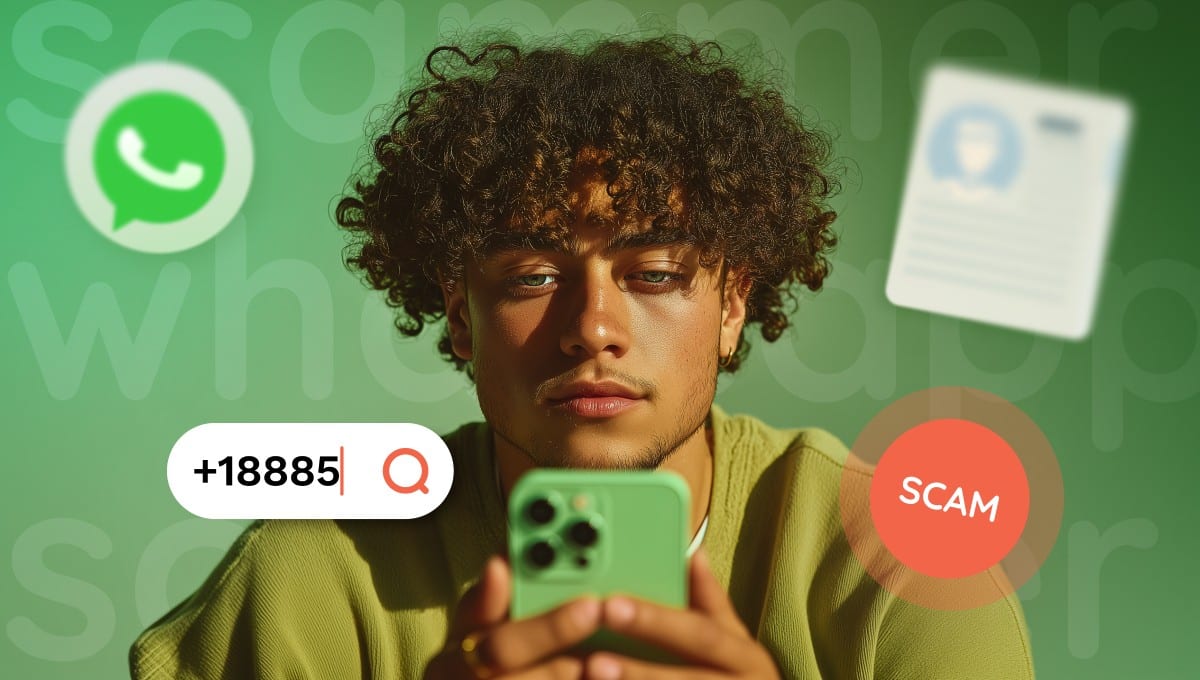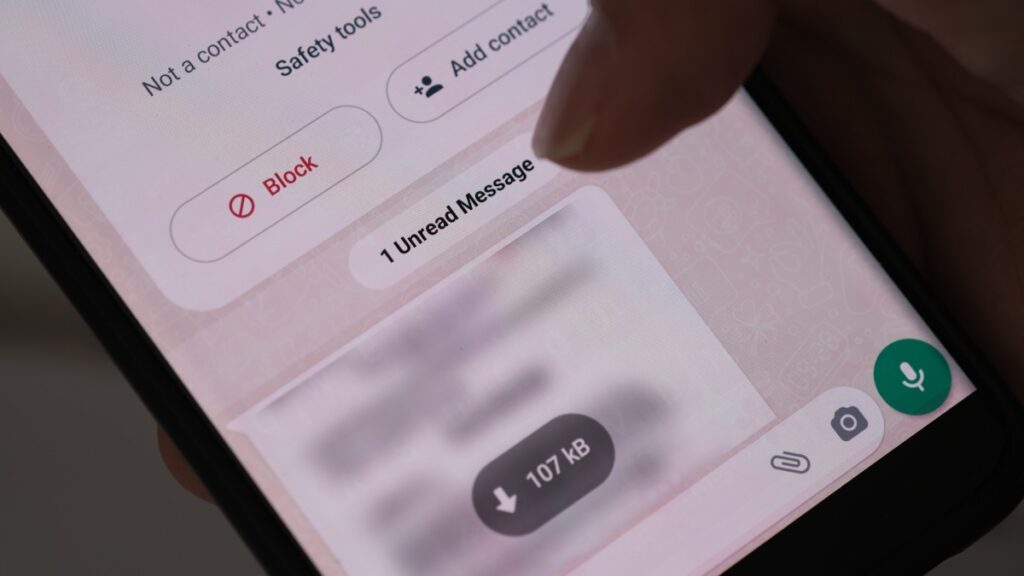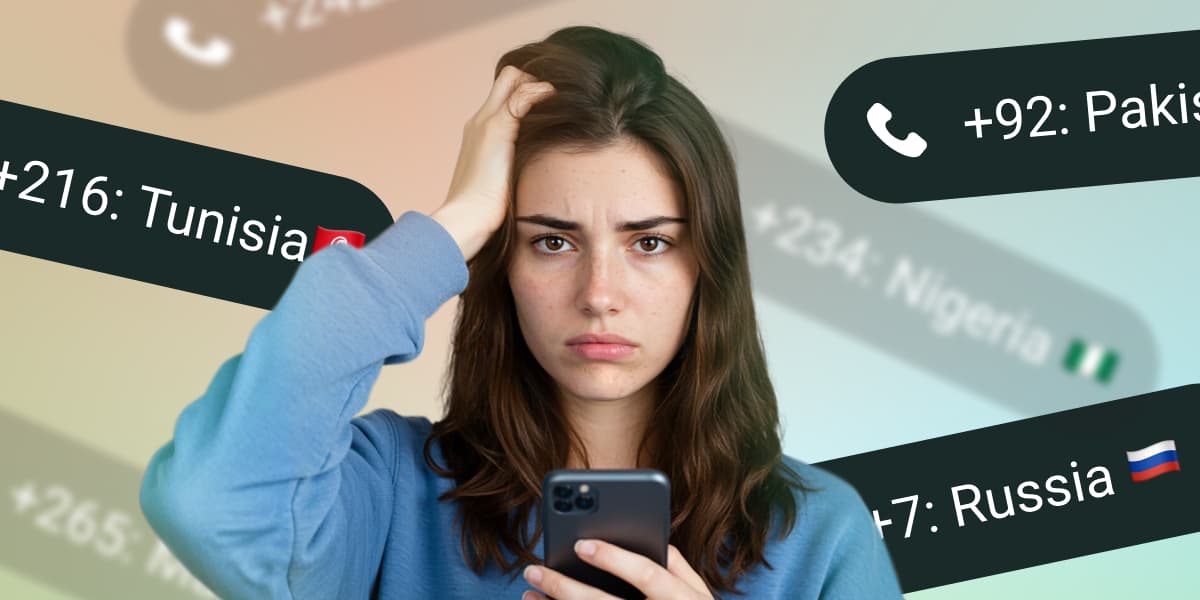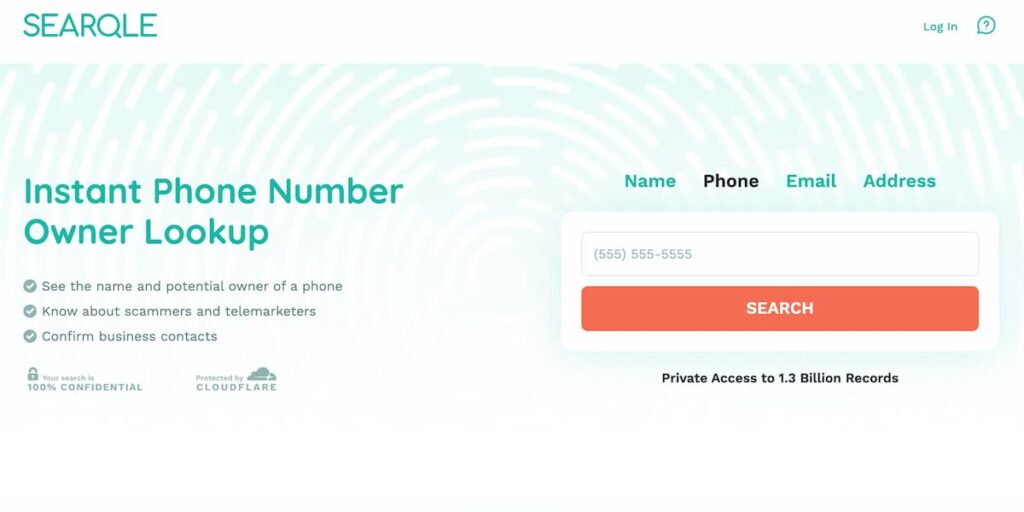How to Track a Scammer on WhatsApp & Uncover Their Real Identity

Can you get scammed through WhatsApp? Absolutely! In fact, over 59 million Americans have been hit by phone scams in just the past few years. And with WhatsApp being one of the most popular messaging apps, scammers are having a field day.
So if you ever received a sketchy message about winning a random lottery or heard from a “long-lost relative” in another country, you better be cautious. Coming up, we’ll show you two practical ways of explaining how to catch a scammer on WhatsApp, including one powerful tool that makes it surprisingly easy.
Tracking a Scammer on WhatsApp: 3 Proven Methods
Figuring out how to track a scammer on WhatsApp isn’t as complicated as it sounds—if you know where to start. Below are three reliable methods that can help you uncover who’s really behind those suspicious WhatsApp messages.
1. Use the Searqle Phone Number Lookup Tool
The most effective way to uncover a WhatsApp scammer is by using the Searqle Phone Number Lookup tool. Why? Because it pulls from billions of public records, online profiles, legal databases, and even social media info to give you detailed insights tied to a phone number, including ones used on WhatsApp.
This database is constantly updated, and it’s way more than just surface-level data. You could get names, addresses, occupations, court records, and even known family members—everything scammers hope stays hidden.
Here’s how to track down someone who scammed you on WhatsApp using Searqle:
- Go to the Searqle.com.
- Select the “phone” tab.
- Enter the WhatsApp number, including the correct country code.
- Hit Search.
In seconds, you’ll get a full profile. With this level of detail, you’ll know exactly who’s behind that suspicious message.
2. Search the Phone Number Online
Another simple (and free) method is just Googling the number. Many websites and forums—like WhoCalledMe, SpamCalls.net, and Reddit—collect and share reports about scam numbers. Just typing the number into a search engine can quickly show if others have been targeted too.
Here’s how to trace a fake WhatsApp number:
- Copy the full WhatsApp number, country code, and all.
- Paste it into Google and search.
If the number has been flagged before, you’ll likely find complaints, warnings, or even exposed identities from other users. It won’t be as thorough as Searqle, but it’s a solid starting point—and it costs nothing.
3. Review their WhatsApp Profile
Sometimes, just taking a closer look at the scammer’s profile can reveal plenty. Their laziness or carelessness often gives them away.
Here’s how to identify a scammer on WhatsApp just by checking the profile:
- Start with the profile picture. Is it a stock photo? An overly polished image that looks like it belongs to a model? Blurry? Or worse—no picture at all?
- Next, check the status. Scammers tend to use vague quotes or awkward, broken language. Some even claim to be a “wealthy investor” or promote “exclusive deals.” If it feels too good to be true, it probably is.
- Look at the country code. If someone says they’re local but their number starts with a code from another country, that’s an obvious red flag.
- Pay attention to how empty the profile is. No “About” info, no “Last seen,” no mutual groups? If the profile looks blank or suspiciously generic, trust your gut.
Real people usually have at least a few consistent personal details. Scammers don’t.
How to Identify a Scammer on WhatsApp?

Scammers on WhatsApp are getting sneakier. They’re becoming so polished that even smart, tech-savvy people are falling for it.
“Scams are evolving at ‘breakneck speed’. We’re hearing of instances where AI voice impersonation technology is being used to create WhatsApp and SMS voice notes, making the scam seem ever more realistic.” —Chris Ainsley, Head of Fraud Risk Management at Santander.
You need to stay sharp and watch for these red flags. If you notice any of them, block and report the person immediately:
- They ask for personal information or money: No legitimate business or person will urgently demand bank details, passwords, or payments over WhatsApp.
- Poor grammar and awkward language: Many scammers are from non-English-speaking countries. Expect strange phrasing or spelling mistakes, though AI is helping them sound better now.
- They send shady links: If they send links to “claim prizes,” “verify accounts,” or “WhatsApp Gold” (a known scam), don’t click! These could be phishing websites or trigger malware downloads.
- They create urgency: Messages like “Your account will be deleted in 10 minutes!” are designed to make you panic and act fast.
- They manipulate emotions: Some might pretend to be in trouble or play the “long-lost cousin” or “I’m stranded and need help!” card to get sympathy.
- Too-good-to-be-true offers: Think “You’ve won a car!” or “Free iPhone if you forward this message!” That’s a scam.
- Unusual phone numbers: Watch out for contacts from unfamiliar countries or numbers with too many digits.
- They avoid video/voice calls: If someone refuses to show their face or speak to you, that’s a red flag.
If anything feels off, don’t ignore it. Your instincts are often right.
How to Report a Scammer on WhatsApp
If you suspect a scam, report it immediately. Here’s how to do it within WhatsApp:
- Open the chat with the suspicious contact.
- Tap on their name or number at the top of the screen to open their profile.
- Tap the three dots (⋮) > More > Report.
- WhatsApp will ask if you’d like to block the number and delete the chat—confirm if you do. Your recent five messages will also be sent to WhatsApp to help their team investigate.
Keep reporting. It isn’t just for your safety—it helps protect everyone else, too. The more reports “WhatsApp” gets on a number, the faster they can shut it down.
How to Protect Yourself from Suspicious Numbers

Scammers can’t touch you if you’re prepared. Here’s how to stay one step ahead:
- Don’t rush. If someone pressures you to act fast, slow down.
- Look up unfamiliar numbers using fake WhatsApp number trackers like Searqle before responding, especially if they ask for anything personal.
- Limit who can see your last seen, profile picture, and status in WhatsApp settings.
- Enable two-step verification. Add an extra PIN to your WhatsApp account by going to Settings > Account > Two-Step Verification.
- Never share your full name, address, or banking info with unknown persons, even if the conversation feels casual.
- Avoid clicking on unknown links. Even if it’s from a friend, double-check. Their account could be hacked.
FAQ
Scammers love WhatsApp because it’s fast, free, and used by billions. Plus, it offers encryption, making it harder for authorities to track them. WhatsApp also supports links, voice notes, and attachments, making it easy for scammers to spread phishing links or fake stories in a more “personal” way. Most people also don’t verify unknown numbers, making it easy to pose as a friend, business, or government agency.
Not directly. WhatsApp won’t show someone’s location unless they send it voluntarily, which scammers won’t. However, fake WhatsApp number tracker tools like Searqle can sometimes provide the last known location or registered address related to the number. You can also check for country codes in the number to get a rough idea of where the scammer is operating from.
Absolutely—block them immediately! Engaging with a scammer (even to “mess with them”) can lead to more spam or phishing attempts. But before you block them, report the number to WhatsApp so they can investigate and potentially ban the account. If you’ve already shared sensitive info, also alert your bank or local cybercrime unit to prevent further damage.
Conclusion
If you’re wondering how to track a scammer on WhatsApp without them knowing, your best option is Searqle. It’s the most reliable way to uncover a scammer’s identity, location, and other key details—all while keeping your investigation discreet.
Combine this with WhatsApp’s reporting tools and a few smart privacy habits. The key is to stay alert, trust your instincts, and take action quickly. With the right steps, you can shut down the scam before it even starts.



